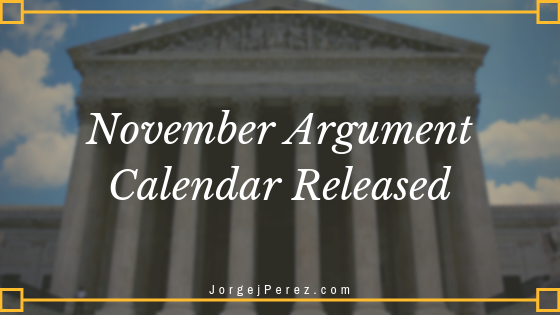This November, the Supreme Court will hear oral arguments for a number of cases over the course of ten days, excluding the federal holiday on November 11. The argument calendar for November was released on Monday, July 8, and the cases featured involve a variety of issues including immigration, pollution, and racial discrimination.
Among these cases, one is slated to be among the most significant disputes heard by the Supreme Court this term. Three cases—Department of Homeland Security v. Regents of the University of California, Trump v. NAACP and McAleenan v. Vidal —have been consolidated and will be beard on November 12; the Supreme Court will determine whether the Department of Homeland Security’s decision to end the Deferred Action for Childhood Arrivals (DACA) policy is reviewable by the court and, if so, whether the decision to end the policy is lawful.
Amy Howe writes about the cases to be heard in November, as seen below.
_______
The Supreme Court released the calendar for its November sitting today. On November 12, the justices will hear oral argument in what promises to be one of the biggest disputes of the term: the challenge to the Trump administration’s decision to terminate the program known as “Deferred Action for Childhood Arrivals,” or “DACA,” which allowed young adults who were brought to this country illegally as children to apply for protection from deportation. On the same day, the justices will also hear – for the second time – oral argument in a lawsuit brought by the family of a Mexican teenager who was shot by a U.S. Border Patrol agent across the U.S.-Mexico border.
The justices did not schedule New York State Rifle & Pistol Association v. City of New York, the challenge to the city’s ban on transporting a licensed handgun outside city limits, for oral argument. The case was granted in January and is now the oldest case not yet slated for oral argument, but last week the city told the court that the case is moot as a result of changes to both city and state laws.
During the sitting, which begins on Monday, November 4, the justices will hear a total of 10 hours of oral argument in 12 cases over five days; there are no arguments on Monday, November 11, which is a federal holiday.
A full list of cases scheduled for oral argument follows the jump.
Barton v. Barr (Monday, Nov. 4): Whether a lawful permanent resident who is not seeking to be admitted to the United States can be rendered inadmissible for purposes of the “stop-time” rule, which ends a period of continuous residence if someone commits an offense that would make him inadmissible to the United States.
Kansas v. Glover (Monday, Nov. 4): Whether, for purposes of an investigative stop under the Fourth Amendment, it is reasonable for a police officer to suspect that the registered owner of the car is the person driving the car.
_______
Read about the other eight cases to be heard on the SCOTUSblog.
___
Jorge J. Perez is an attorney in South Florida.

